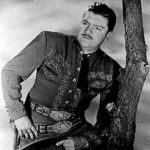|
|||||||||||||||||
José Alfredo Jiménez was a Mexican singer-songwriter in the ranchera style.
His songs are considered an integral part of the Mexican musical heritage and are comparable, for instance, to Woody Guthrie’s influence on American folk music.
He had no musical training—according to the singer Miguel Aceves Mejía, Jiménez didn’t play an instrument and didn’t even know the Spanish terms for “waltz” and “key”. Nonetheless he composed more than 1000 songs. Among the most famous are “Ella”, “Paloma querida”, “Media vuelta”, “El Rey”, “Sin Sangre en las venas”, “El jinete”, “Si nos dejan”, “Amanecí en tus brazos”, “Llegando a ti”, “Tu recuerdo y yo”, El hijo del pueblo”, “Cuando el destino”, “El caballo blanco”, “Llegó borracho el borracho” and “Que te vaya bonito”, as well as “Camino de Guanajuato”, where he sang about his home state of Guanajuato.
In addition to his own hit recordings, many of his songs have been recorded successfully by renowned recording artists from around the Spanish-speaking world, most notably by Miguel Aceves Mejía, Pedro Infante, Rocío Dúrcal, Javier Solís, Pedro Fernández, Jorge Negrete, Vikki Carr, Luis Miguel, Lola Beltrán, Alejandro Fernández, Chavela Vargas, Maná, Antonio Aguilar, Vicente Fernández, Julio Iglesias, Joaquín Sabina, Manolo García, Los Tigres del Norte, and Gualberto Castro.
Jiménez, like others of his contemporaries (Jorge Negrete, Pedro Infante and Javier Solís, the so-called “Three Mexican Roosters”, or Tres Gallos Mexicanos), died young. He was struck-down by hepatitis at age 47 and is regarded, along with Agustín Lara and Juan Gabriel, as one of the best songwriters that Mexico has ever produced. He was certainly one of the most prolific composers in the history of popular music, worldwide.
Shortly before his death, he wrote and recorded his last song, “Gracias”, thanking the public for all of the affection they had shown him. His tomb has become a place of pilgrimage for serious music fans from around the Spanish-speaking world.
Spanish singer and composer Joaquin Sabina pays homage to José Alfredo Jiménez and Mexican singer (of Costa Rican ancestry) Chavela Vargas in his song “Por el bulevar de los sueños rotos”.
Jiménez was married to Julia Gálvez (whom he called “Paloma”) in 1952 and had two children; he later married the daughter of comedian Manuel Medel and fathered three; much later, he married singer Alicia Juárez, who was 27 years younger than he was (he wrote a song about her entitled-in translation– “I Should Have Fallen in Love with Your Mother”).
Jiménez also appeared in numerous Mexican films of the 1950s. Many other movies took their titles from his compositions: Amanecí en tus brazos, Qué bonito amor, La mano de Dios, La vida no vale nada, Me cansé de rogarle, ad infinitum.
iménez’s life was the subject of a 1988 film biography, Pero sigo siendo el rey, starring Leonardo Daniel (the film was based on a story by Paloma Jiménez, which may explain why the Alicia Juárez character–not referred to by that name–is not very favorably portrayed).





